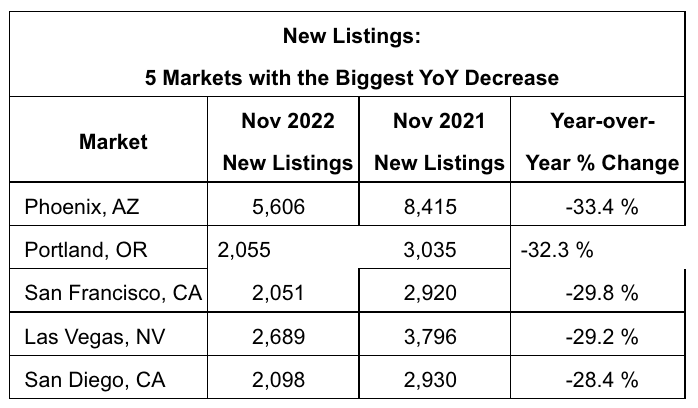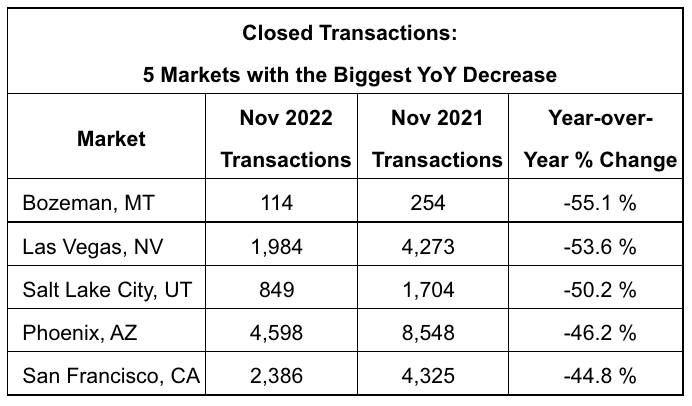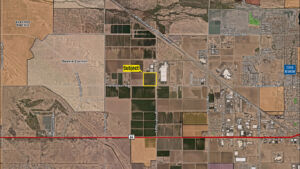November begins a stretch of four months with typically the lowest home sales of the year – including December, January and February – and this November followed suit, according to the RE/MAX National Housing Report for November. Seasonality was just one factor contributing to November’s 12% drop in home sales from October in the report’s 53 metro areas as fluctuating interest rates and ongoing economic uncertainty weigh on the market. And Phoenix distinguished itself by leading the nation with the biggest decrease in new home listings.
“We’ve been seeing a return to a more balanced market, where not just sellers are in the driver’s seat. Sellers and buyers are each able to negotiate, with neither having a built-in upper hand,” said Nick Bailey, RE/MAX President and CEO. “This is especially good news for long-suffering buyers, who are still dealing with affordability issues. Buyers welcome having more choice as there are more homes on the market, and they are taking longer to sell. More good news for buyers: prices are flattening and actually decreasing in some markets. Things may bounce around a bit longer, especially into the first half of 2023, but it seems like the market is shaking off the last vestiges of the 2021 overheating. Balance seems to be returning – as it usually does.”
READ ALSO: Arizona property taxes will see No. 3 greatest 5-year increase
READ ALSO: Arizona No. 2 for largest house price appreciation
Added RE/MAX Gold Manager and REALTOR® Angelo Gallo, who is based in Cupertino, CA, “After several years of what can only be considered abnormal selling and buying seasons, it seems the nine Bay Area counties are starting to experience a more normalized market. Yes, inventory levels have increased, and sales are down, but we must ask ourselves, ‘Compared to what?’ We are now seeing the market return to pre-pandemic levels. That’s not a bad thing. Balance has returned to the Bay Area real estate market, and this is healthy for all consumers.”
New listings tumbled 21.4% from October – reaching their lowest point of the year – as home sellers saw the Median Sales Price drop to $394,000. That was 1.3% less than October though still 3.7% higher than November 2021. The average Close-to-List Price Ratio in November was 98%, meaning that homes sold, on average, for 2% less than the asking price. The ratio was 101% a year ago and flat compared to October 2022.
Other notable metrics include:
• Homes sold in November were on the market for an average of 39 days. That was four more days than in October and a full week more than in November 2021.
• November’s 2.5 months supply of inventory was up from 2.3 in October and more than double the 1.2 of one year ago.
• Though the fourth-highest year-to-date total, November’s 2.5 months supply of inventory was down 5.9% from October following month-to-month inventory increases of 3.9% in September and 2.9% in October.
Highlights and local market metrics for November include:
Decrease in Phoenix home listings leads nation
Of the 53 metro areas surveyed in November 2022, the number of newly listed homes was down 21.4% compared to October 2022, and down 14.3% compared to November 2021. The markets with the biggest decrease in year-over-year new listings percentage were Phoenix home listings at -33.4%, Portland, OR at -32.3%, and San Francisco, CA at -29.8%. Leading the year-over-year new listings percentage increase were Washington, DC at +25.7%, Baltimore, MD at +24.7%, and Dover, DE at +15.7%.

Closed Transactions
Of the 53 metro areas surveyed in November 2022, the overall number of home sales was down 12.0% compared to October 2022, and down 37.0% compared to November 2021. The markets with the biggest decrease in year-over-year sales percentage were Bozeman, MT at -55.1%, Las Vegas, NV at -53.6%, and Salt Lake City, UT at -50.2%. No metro area had a year-over-year sales percentage increase in November.

Median Sales Price – Median of 53 metro area prices
In November 2022, the median of all 53 metro area sales prices was $394,000, down 1.3% compared to October 2022, and up 3.7% from November 2021. The markets with the biggest year-over-year decrease in median sales price were Des Moines, IA at -4.2%, San Francisco, CA at -1.7%, and Pittsburgh, PA at -1.0%. Five metro areas increased year-over-year by double-digit percentages, led by Fayetteville, AR at +19.6%, Omaha, NE at +12.2%, and Orlando, FL at +11.6%.
Close-to-List Price Ratio – Average of 53 metro area prices
In November 2022, the average close-to-list price ratio of all 53 metro areas in the report was 98%, flat compared to October 2022, and down from 101% compared to November 2021. The close-to-list price ratio is calculated by the average value of the sales price divided by the list price for each transaction. When the number is above 100%, the home closed for more than the list price. If it’s less than 100%, the home sold for less than the list price. The metro areas with the lowest close-to-list price ratio were a tie between Coeur d’Alene, ID and Miami, FL at 95%. The highest close-to-list price ratios were Burlington, VT at 102%, followed by a four-way tie between Hartford, CT, Manchester, NH, Richmond, VA, and Trenton, NJ at 101%.




